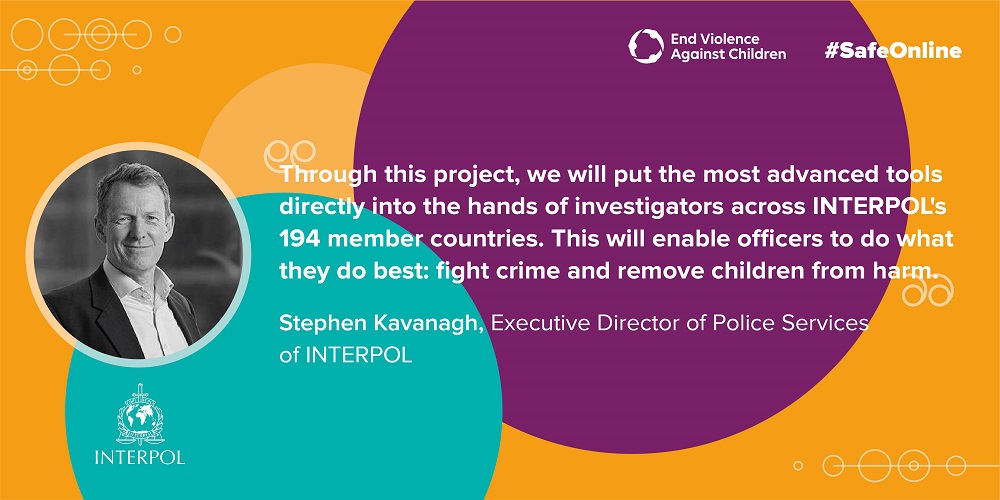
End Violence has invested $10 million more to keep children #SafeOnline. Through our latest funding round, we are welcoming 14 new projects into our Safe Online portfolio – all of which are using cutting-edge technology to fight online child sexual exploitation and abuse.
Our Digital Groundbreaker series was created to introduce the End Violence community to the grantees spearheading these new projects. Each week, we are profiling a different grantee from our newest funding round, each of which were given $450,000-$750,000 to push a solution to online violence forward.
Today, we are focusing on INTERPOL, which will use End Violence funding to bring the most advanced technology to investigators of online child sexual exploitation and abuse. End Violence spoke with Valdecy Urquiza, the Assistant Director of INTERPOL’s Vulnerable Communities Sub-Directorate, to learn more about their priorities, programme, and insights around online exploitation and abuse.
What do you feel is the biggest threat to children online?
In general terms, the biggest threat to children online is sexual exploitation. This, however, may come in a variety of forms, ranging in the level of risk and damage to the child victim themselves.
The global reach and anonymity of the internet, along with its accessibility through mobile devices, have greatly increased the vulnerability of children. Offenders often use social media platforms and other applications to prey on children, and use deception, grooming, and blackmail to obtain a child’s cooperation. These behaviours can span over an extended period of time, during which the child suffers from both physical and psychological abuse.
Unfortunately, the damaging effects of abuse do not stop when the abuse ends. Images or videos of the victim can circulate long after the abuse has taken place, causing continued suffering and victimisation. Sadly, there is no way today to fully remove such material from the internet with certainty.
How will the new funding from End Violence enable you to do tackle that threat? What are the key expected results of your project?
End Violence’s new funding will help INTERPOL develop dedicated solutions to facilitate the investigation and prevention of online child sexual exploitation. Through its DevOps working group and End Violence funding, INTERPOL can progress the development of solutions and their extension to specialised units through its secure global network. While some tools will be aimed at expediting the investigation of crimes, both already committed or ongoing, others will focus on prevention. We will seek out the latest technology to detect risks as early as possible, preventing abuse or the escalation of a potentially harmful situation for a child.
What was your organisation’s most successful experience against online violence in the past?
INTERPOL provides a comprehensive programme of activities to support specialised units and investigators in our 194 member countries including providing leads, contributing to investigations, training, and capacity building. We also develop dedicated tools designed to assist child sexual exploitation investigations.
One of INTERPOL’s major successes is the development and evolution of the International Child Sexual Exploitation database, which is hosted in the INTERPOL Secure Cloud and available to specialised units in member countries over its secure global network. This database, dedicated to the analysis of images and videos of child sexual exploitation, includes advanced tools to aid the identification of victims and offenders.
The database contains 3,582,750 files, including more than 23,000 identified victims and 11,000 identified offenders. The work carried out by our Crimes Against Children Unit and specialised investigators around the world regularly leads to the identification of offenders and the safeguarding of child victims. Recently, we supported the Brazilian Federal Police identify and arrest a 50-year-old man suspected of abusing a number of victims aged 5 to 12 over a prolonged period of time. He then shared images and videos of the abuse on the internet, becoming highly popular within child sex abuse fora on the Dark Net. Similar examples are published on INTERPOL's website.
What motivates you, as an individual, to work on this subject?
While all types of crimes deserve attention, child sexual exploitation is a type of crime that affects us in a deep and personal way. We all have children of our own, or close to us, and want them to grow up enjoying a safe and happy childhood. The innocence and vulnerability of children are both what makes this crime area so terrible, and what motivates me and other investigators fight exploitation. Working with the images and videos of such abuse is not easy, but it also gives you an understanding of the horrific reality these children live through, and what a difference you can make for each child you safeguard.
If you had a superpower to do one thing to end online sexual exploitation and abuse, what would it be?
With the current extent of child sexual exploitation online, it is unfortunately hard to think of one single thing that could put an end this heinous phenomenon. It will take a sustained, concerted effort to minimise the online exploitation and abuse of children.
One of the elements that currently plays a role in the abuse of children online is the growing availability of online communication platforms offering anonymity to users, either in the form of end-to-end encryption or through a lack of record-keeping of activity. This poses a growing threat to child safety that needs to be better understood. I believe the solution to fix this issue involves a greater collaboration with the private sector, discussion of improved techniques for data collection, and a recognition that end-to-end encryption offers safety for certain groups and violence for others. There is a need for more investment in innovation for law enforcement. One piece of evidence is all it takes to break a case and change the life of vulnerable child.